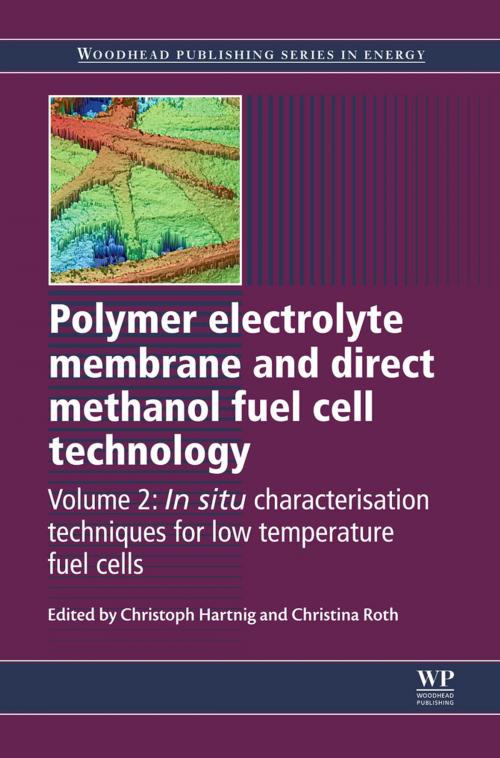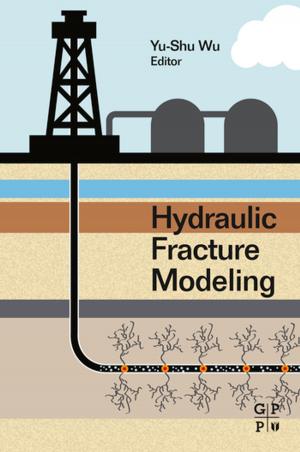Polymer Electrolyte Membrane and Direct Methanol Fuel Cell Technology
Volume 2: In Situ Characterization Techniques for Low Temperature Fuel Cells
Nonfiction, Science & Nature, Technology, Power Resources| Author: | ISBN: | 9780857095480 | |
| Publisher: | Elsevier Science | Publication: | February 20, 2012 |
| Imprint: | Woodhead Publishing | Language: | English |
| Author: | |
| ISBN: | 9780857095480 |
| Publisher: | Elsevier Science |
| Publication: | February 20, 2012 |
| Imprint: | Woodhead Publishing |
| Language: | English |
Polymer electrolyte membrane fuel cells (PEMFCs) and direct methanol fuel cells (DMFCs) technology are promising forms of low-temperature electrochemical power conversion technologies that operate on hydrogen and methanol respectively. Featuring high electrical efficiency and low operational emissions, they have attracted intense worldwide commercialization research and development efforts. These R&D efforts include a major drive towards improving materials performance, fuel cell operation and durability. In situ characterization is essential to improving performance and extending operational lifetime through providing information necessary to understand how fuel cell materials perform under operational loads.
Polymer Electrolyte Membrane and Direct Methanol Fuel Cell Technology, Volume 2 details in situ characterization, including experimental and innovative techniques, used to understand fuel cell operational issues and materials performance. Part I reviews enhanced techniques for characterization of catalyst activities and processes, such as X-ray absorption and scattering, advanced microscopy and electrochemical mass spectrometry. Part II reviews characterization techniques for water and fuel management, including neutron radiography and tomography, magnetic resonance imaging and Raman spectroscopy. Finally, Part III focuses on locally resolved characterization methods, from transient techniques and electrochemical microscopy, to laser-optical methods and synchrotron radiography.
With its international team of expert contributors, Polymer electrolyte membrane and direct methanol fuel cell technology will be an invaluable reference for low temperature fuel cell designers and manufacturers, as well as materials science and electrochemistry researchers and academics. Polymer electrolyte membrane and direct methanol fuel cell technology is an invaluable reference for low temperature fuel cell designers and manufacturers, as well as materials science and electrochemistry researchers and academics.
- Details in situ characterisation of polymer electrolyte membrane fuel cells (PEMFCs) and direct methanol fuel cells (DMFCs), including the experimental and innovative techniques used to understand fuel cell operational issues and materials performance
- Examines enhanced techniques for characterisation of catalyst activities and processes, such as X-ray absorption and scattering, advanced microscopy and electrochemical mass spectrometry
- Reviews characterisation techniques for water and fuel management, including neutron radiography and tomography, and comprehensively covers locally resolved characterisation methods, from transient techniques to laser-optical methods
Polymer electrolyte membrane fuel cells (PEMFCs) and direct methanol fuel cells (DMFCs) technology are promising forms of low-temperature electrochemical power conversion technologies that operate on hydrogen and methanol respectively. Featuring high electrical efficiency and low operational emissions, they have attracted intense worldwide commercialization research and development efforts. These R&D efforts include a major drive towards improving materials performance, fuel cell operation and durability. In situ characterization is essential to improving performance and extending operational lifetime through providing information necessary to understand how fuel cell materials perform under operational loads.
Polymer Electrolyte Membrane and Direct Methanol Fuel Cell Technology, Volume 2 details in situ characterization, including experimental and innovative techniques, used to understand fuel cell operational issues and materials performance. Part I reviews enhanced techniques for characterization of catalyst activities and processes, such as X-ray absorption and scattering, advanced microscopy and electrochemical mass spectrometry. Part II reviews characterization techniques for water and fuel management, including neutron radiography and tomography, magnetic resonance imaging and Raman spectroscopy. Finally, Part III focuses on locally resolved characterization methods, from transient techniques and electrochemical microscopy, to laser-optical methods and synchrotron radiography.
With its international team of expert contributors, Polymer electrolyte membrane and direct methanol fuel cell technology will be an invaluable reference for low temperature fuel cell designers and manufacturers, as well as materials science and electrochemistry researchers and academics. Polymer electrolyte membrane and direct methanol fuel cell technology is an invaluable reference for low temperature fuel cell designers and manufacturers, as well as materials science and electrochemistry researchers and academics.
- Details in situ characterisation of polymer electrolyte membrane fuel cells (PEMFCs) and direct methanol fuel cells (DMFCs), including the experimental and innovative techniques used to understand fuel cell operational issues and materials performance
- Examines enhanced techniques for characterisation of catalyst activities and processes, such as X-ray absorption and scattering, advanced microscopy and electrochemical mass spectrometry
- Reviews characterisation techniques for water and fuel management, including neutron radiography and tomography, and comprehensively covers locally resolved characterisation methods, from transient techniques to laser-optical methods















